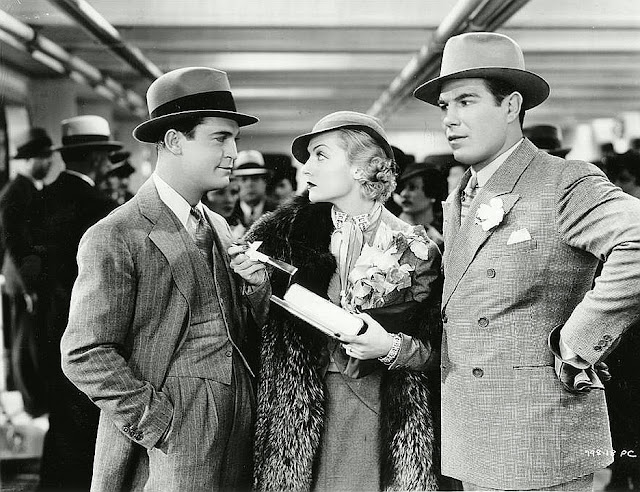This post is sponsored by DVD Netflix.
“The more I give to thee, the more I have, for both are infinite.” – Romeo & Juliet, William Shakespeare
Gloria Grahame has always been a complicated figure in the classic film world. She was a talented actress with a frank sexuality that made her captivating to watch on screen. She was electric. Grahame had a gift for playing complex women because she knew what it was to be one. Plagued by an internal battle with self-esteem, she was obsessed with her upper lip, stuffing it with cotton until she finally had plastic surgery to fix what she thought was a physical flaw. She married four times and had four children but it was her last marriage to former stepson Anthony Ray, son of her second husband director Nicholas Ray, that caused a major scandal effectively ending her movie career. In her final years, Grahame focused on TV work and worked on the stage. No longer the movie star she once was she still chased the dream of playing interesting women to an eager audience.
In 1987 Peter Turner, Grahame’s lover and close friend published a memoir called Film Stars Don’t Die in Liverpool. It chronicled their time together and Grahame’s final days as she succumbed to the breast cancer and peritonitis that would kill her in October of 1981. Three decades after the memoir hit bookstores, a new biopic brings their story to the silver screen.
Directed by Paul McGuigan, Film Stars Don’t Die in Liverpool (2017) stars Annette Bening as Gloria Grahame. Told in a series of flashbacks, the story begins when Grahame collapses just as she's about to go on stage for her performance in The Glass Menagerie. Her now former lover Peter Turner (Jamie Bell) takes her in where his family, especially his doting mother (Julie Walters) takes care of the failing Grahame. The story shifts between 1979 and 1981 and as we follow the trajectory of Grahame and Turner’s romance. The two meet as struggling actors living in a rundown apartment building in Liverpool. Drawn to each other like moths to flames, they start a passionate love affair. They share a mutual love for theater and for each other. Grahame takes Turner with her to New York and Los Angeles, he meets her mother (Vanessa Redgrave) and sister Joy (Frances Barber) in what turns out to be a very unfortunate gathering. Grahame is constantly struggling with getting older and any mention her age sets her on edge. The age gap between her and Turner doesn't help things either. When faced with mortality, Grahame decides to move forward on her own terms. The two part ways only to be reunited when Grahame needs Turner the most.
There are no real spoilers in this film unless you know nothing about Gloria Grahame’s life. While the story touches upon her former career, we see clips from In a Lonely Place (1950) and her accepting her Oscar for The Bad and the Beautiful (1952), the movie is only concerned with those final years in Liverpool with Peter Turner. The film is intimate and sensual. Bening and Bell have a chemistry that made the onscreen love affair believable. While they were both age appropriate for their roles, I didn’t quite see Grahame and Turner in Bening and Bell. Did they completely pull off playing these parts? Only Peter Turner himself will ever know for sure. They are however very convincing as an aging actress in failing health who falls in love with a much younger actor.
 |
| Jamie Bell and Annette Bening in Film Stars Don't Die in Liverpool (2017) |
I love how this film approached a critical point in their relationship. We see both perspectives rather than just Turner’s. Also Grahame is as complicated in this movie as she was in real life. She is a perplexing character. Is she sabotaging herself with her self-destructive behavior? Or is she just a strong-willed woman choosing to live the rest of the days on her own terms. Or maybe a bit of both? This film is filled with moments of joy and sadness but ultimately it will break your heart.
Produced by Barbara Broccoli, daughter of Albert R. Broccoli, for Eon Productions which has long been known for producing the James Bond films. This is one of their rare ventures outside the franchise. The movie reunites Jamie Bell and Julie Walters 17 years after they made Billy Elliot (2000).
The DVD comes with a bunch of special features including commentary track by director Paul McGuigan, producer Barbara Broccoli and Peter Turner himself. There is also a short vignette of Annette Bening talking about Gloria Grahame and an Elvis Costello music video with accompanying behind the scenes shorts. There is also a 31 minute film panel interview featuring Annette Bening, McGuigan, Turner and Jamie Bell. I can't tell what event it's from but I know it was hosted by Variety and FilmStruck. I couldn't watch more than 10 minutes of this because the interviewer did such a poor job asking her questions. I want to give her the benefit of the doubt. Maybe she was really nervous? Maybe this was a last minute gig and she didn't have time to prepare? It was so uncomfortable to watch that I just couldn't get through it.
Disclaimer: As a DVD Nation director, I earn rewards from DVD Netflix. You can rent Film Stars Don’t Die in Liverpool on DVD.com. And while you're at it check out their 20th Anniversary site with lots of cool features, videos and ways to earn swag.
I won a copy of this movie by entering DVD Netflix's giveaway on Instagram. They regularly feature new DVD releases on their account so make sure to follow them there!
















